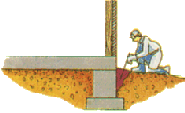Musing to myself, I guess we can add the Canadian government to the list of Bayer Subsidiaries:
http://www.cdpr.ca.gov/docs/emon/pubs/fatememo/imid.pdf
Musing to myself, I guess we can add the Canadian government to the list of Bayer Subsidiaries:
http://www.cdpr.ca.gov/docs/emon/pubs/fatememo/imid.pdf
Last edited by Neils; 29-06-2012 at 03:07 AM.
Err,...no they don't.
That pesky evidence is missing again.
http://www.xerces.org/wp-content/upl...s-Society1.pdf
Page 13.
The half life of Imidacloprid in soil is 40-997 days. (National Pesticide Information Center 2010)
Environmental Fate of Imidacloprid, Juanita Bacey, Environmental Monitoring & Pest Management Branch, Department of Pesticide Regulation, 830 K Street, Sacramento, Ca 95814
http://www.cdpr.ca.gov/docs/emon/pubs/fatememo/imid.pdf
Page 3
Page 5Soil photolysis half-life 38.9 days
Field dissipation half-life 26.5 to 229
Where does your claim of 20 years come from.Soil: The high water solubility and low Koc, indicate a low tendency to be adsorbed to
soil particles. Field studies show that imidacloprid can persist in soil, with a half-life
ranging from 27 to 229 days (Miles Inc., 1993). Half-life in soil varies depending on
soil type, use of organic fertilizers, and presence or absence of ground cover. Scholz et
al. (1992) found that imidacloprid degraded more rapidly under vegetation, t1/2 48 days,
versus 190 days without vegetation. Degradation on soil via photolysis has a t1/2 of 39
days. In the absence of light, the longest half-life of imidacloprid was 229 days in field
studies and 997 days in laboratory studies (Miles Inc., 1993). This persistence in soil,
without the presence of light, makes imidacloprid suitable for seed treatment and
incorporated soil applications because it allows continual availability for uptake by roots
(Mullins, 1993).
Maybe from a planet with a shorter year.
Last edited by Jon; 29-06-2012 at 09:58 AM.
The data for soil half life will vary greatly depending on conditions, of course.
But let's hear it from the horse's mouth:
Bayer are so confident of the effectiveness of its Premise product, that they provide a written guarantee to termite controllers in the USA who fully treat the soil areas at the base of a structure as per the Premise label requirements.
Part of the Bayer terms and conditions of such a guarantee states in effect “if Premise fails to stop termites at any time within seven years of initial treatment, Bayer will reimburse up to 100% of product and labor costs involved in retreatment to a maximum of $1000 for residential accounts and $5000 for commercial accounts. Bayer will also guarantee to pay the termite controller's damage claim insurance deductible up to $500 per structure”.
http://www.termite.com/premise.html
If Bayer themselves guarantee that Imidacloprid is effective for 7 years in soil, then all your lab derived figures are worthless.
Surely Bayer wouldn't guarantee it if they wouldn't be sure that it lasts at least that long. And it doesn't even mention type of soil, moisture or temperature, so this has to be a minimum duration whatever the conditions. In some inactive soils you can easily get half lives of twenty years and more then.
Last edited by Stromnessbees; 29-06-2012 at 09:55 AM.
So are you talking 20 years or 7 years?
You need to provide a reference for the 7 years as the longest half life in lab studies has been found to be 997 days.
So you have termites and maize on Orkney?How dare you call his position quasi religious and theoretical?
Over generalising from little information is a dangerous game.
I believe Orkney is varroa free and neonicotinoid free as well.
EDIT
Just clicked on your link above which is a web page from a termite control company.
The 7 years is not the half life of Imidacloprid. It is a claim for the effectiveness of the product after the soil around a property is injected which is subject to an annual inspection by the pest control company.

Last edited by Jon; 29-06-2012 at 10:37 AM.
Any insecticide with a prolonged residual effect, be it 6 months ,3 years or 19 years halflife, if it is used annually on the same ground ,will inevitably build up concentration. Does this not bother you?
Yes, you're right we don't have varroa here, or OSR anymore, but that doesn't mean we can't express our concerns for those that do.
I would not worry about the application of a product around the foundations of a house to control termites as shown in the illustration above as it is a spot application with little wider impact on the environment. I worry far more about airborne spraying and products which are dangerous for agricultural workers or fish and mammals.
No kidding John, we need to establish what are the least worst options with regard to pesticides as some are worse than others.
If your mind is already 100% made up about neonicotinoids then you are a campaigner rather than an independent seeker of the truth.
I have no problem with campaigners but I stop taking them seriously when they ignore evidence, or inconvenient facts.
It is important to establish what are facts and what is nonsense such as a 20 year half life for imidacloprid in soil. More typical would be a period of months.
Posting misinformation helps noone. Wikipidia and youtube are not reliable sources of information.
Bookmarks